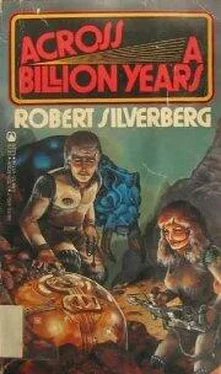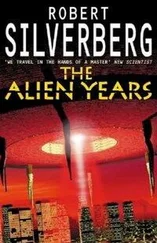Nor had time harmed the robot. Incredibly, it still functioned; the combination of High Ones engineering skill and a protective environment of vacuum had given it the ability to withstand all decay. As our lights flashed across its domed head, we saw its vision panel changing hues in response — the robot equivalent of blinking, I guess. Otherwise it gave no sign of awareness. We confronted it, standing in a row outside the vault and not daring to go near, for many minutes.
What now? We were stymied.
Then I remembered the globe and our plans for using it as a means of communication. I reminded Dr. Schein of this, and he sent me back to the ship to get it.
The globe was mounted on rollers now. I pushed it within twenty meters of the vault entrance.
“Switch it on,” Dr. Schein ordered.
My hand found the stud. The sphere of greenish light took form around me, widening until its perimeter reached across the threshold of the vault. Images of the High Ones began to swim in the air. Their airy cities, their rooms, their highways, even the sequence of the construction of this very vault, came into view. The robot’s vision panel flickered madly; its glow raced through the visible spectrum, descending from high purple to deep red, and tumbling into the infrared, where I saw nothing but felt the sudden hot glow emanating from the vault.
The robot stirred.
Slowly, awkwardly, like an Egyptian mummy awakening from a sleep of millennia, the seated robot rose, pitching forward into a kind of squatting posture, then unfolding its pillar-like legs. We watched, frozen, terrified, fascinated, as the huge thing came to its full height of at least three and a half meters. It stood erect for perhaps a minute, testing its four arms, extending them as if stretching. It contemplated the scenes that were coming from the globe.
Then it began solemnly to stride out of the vault toward us.
Everyone about me panicked and began to run. I held my ground, more out of bewilderment than courage. And so I stood alone as the robot emerged from the vault and drew near me, a gleaming metal colossus nearly twice my own height.
Two of its arms reached down. Webbed metal fingers slid from recesses in the fist-like swellings at the end of each arm. Gently the fingers engulfed the globe. The robot took it and raised it high above its head, as though about to hurl it down at me with terrible force.
I turned and raced toward the ship, not bothering at all to compensate for the gravity, simply leaping and bounding along. Eager hands reached for me and pulled me in.
I looked back. The robot had not budged. Like a titan holding a world in its grip, it still held the globe aloft. Motionless, lost in a billion-year-old dream, it stared up at it.
Two hours have passed now, since I came into the ship. In that time the robot has remained quite still; and we have huddled within the ship, baffled, frightened, yet deeply curious. Dr. Horkkk, Dr. Schein, and Pilazinool are once more conferring, up front in the ship’s control cabin. I have no idea what happens next. We’ve fulfilled our gaudiest dreams; we’ve come straight to the asteroid where the High Ones built their vault, have found the vault, have found the robot still in working order. It’s all like the kind of dreams that addicts buy in sniffer palaces. But now reality has broken in on the dream. The robot waits for us out there. One of us already is dead. Do we dare meet the challenge? Or, having made the archaeological discovery of the epoch, will we go slinking away in quonking terror? I don’t know.
And the robot still waits, as it’s waited for a billion years.
January 2, 2376
The Asteroid
Yesterday morning Pilazinool called for volunteers to go out and attempt to communicate with the robot. Jan’s hand was the first to rise; mine followed, and then most of the others, with the notable exceptions of Steen Steen and Leroy Chang. The group that finally went included Pilazinool, Dr. Horkkk, Mirrik, and me. Jan didn’t like having to stay behind, but I was relieved that she wasn’t picked.
We crossed the bare rocky plain in single file, Pilazinool leading, Mirrik in the rear. All of us except Dr. Horkkk were armed; I carried a positron gun that was probably capable of blowing the robot up, but I wasn’t sharp on using it.
When we were within twenty meters of the robot we halted and fanned out widely. Dr. Horkkk stepped forward. In his left hands he carried a little blackboard; in one of his right hands he held an inscription node. The robot took no notice of him. It still stood as though a statue, holding the globe aloft, though images no longer came from it.
Dr. Horkkk slowly waved the inscription node from side to side, trying to catch the robot’s attention. That took courage. The robot might be easily annoyed. After a few minutes Dr. Horkkk began to copy the hieroglyphics from the inscription node onto his blackboard, keeping the blackboard turned so that the robot could see what was happening. The idea was to demonstrate to the robot that we are intelligent creatures, capable at least of copying High Ones writing even if unable to understand it.
“Suppose what he’s copying is obscene?” Mirrik murmured. “Or unfriendly? What if it makes the robot angry?”
Dr. Horkkk went on sketching hieroglyphics. Gradually the robot started to show interest in him. It lowered the globe to chest-height. It stared down at the small Thhhian, and the colors of its vision panel darkened; pale greens and yellows gave way to rich maroon, shot through with crimson threads. The equivalent of a frown, maybe? The colors of deep concentration? Dr. Horkkk’s inscription node suddenly went blank, and a new inscription appeared. Calmly Dr. Horkkk erased his blackboard and began to copy the current message. The robot seemed impressed. From somewhere within its cavernous chest there boomed sounds that our suit radios were able to pick up.
“Dihn ahm ruuu dihn korp!”
Who knows what it means? But we assume that it’s in the language of the High Ones.
Dr. Horkkk took another calculated risk. He put down his blackboard, stepped forward three paces, and said in clear tones, “Dihn ahm ruuu dihn korp!”
It was an excellent imitation. But for all Dr. Horkkk knew, he was accepting a challenge to a duel, casting aspersions on the robot’s ancestry, or agreeing that he deserved to be obliterated on the spot. However, the robot’s reaction was mild. It flashed a stream of violet light along its vision panel, extended its leftmost arm in a kind of beckoning gesture, and said, “Mirt ahm dihn ruuu korp.”
“Mirt ahm dihn ruuu korp,” Dr. Horkkk repeated.
“Korp mirt hohm ahm dihn.”
“Korp mirt hohm ahm dihn.”
“Mirt ruuu chlook.”
“Mirt ruuu chlook.”
And so on for several minutes. After a while Dr. Horkkk ventured to mix up the now-familiar words, rearranging them into new patterns to give a pretense at conversation: “Ruuu mirt dihn ahm” and “Korp ruuu chlook korp mirt” and so forth. This had the virtue of showing the robot that Dr. Horkkk was something other than some kind of recording machine, but it must have been puzzling to it to be getting these gibberish responses to its statements.
Then the robot turned on the globe. The scene that took form about us was the sequence of the construction of the vault, beginning as usual with the wide-angle view of the galaxy, then the close-up of the immediate stellar neighborhood. The robot pointed to the pattern of projected stars. Then it switched the globe off and pointed first to the very different pattern of stars in the present-day sky of the asteroid, then to the burned-out dwarf star.
That seemed intelligible enough. The robot was telling us that it realized, from the astronomical changes it observed, that a vast span of time must have elapsed since it had been sealed into the vault.
Читать дальше












